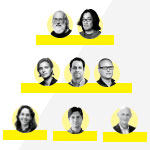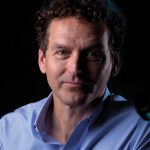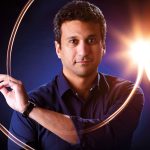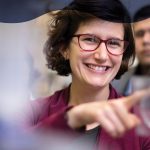COVID-19 Feature A conversation with Martin Hetzer
In the last few months, Salk Vice President and Chief Science Officer Martin Hetzer spearheaded the Institute’s efforts to respond to the pandemic from both an administrative as well as a scientific perspective. Inside Salk spoke with Hetzer on how he led the charge to shift research in the face of continuing uncertainty, as well as what makes him hopeful about Salk’s—and the world’s—future.
Very early on in the face of the COVID-19 pandemic, you set up a COVID-19 Task Force and other committees to handle the rapidly changing day-to-day circumstances for the thousand-plus employees at the Institute. At the same time, you and other faculty began evaluating ways that Salk’s unique research strengths could help tackle COVID-19. What did it take to so swiftly change course for such a prolific and productive Institute?
We took several big steps early on when the pandemic was first coming to light. At that time, in early March, it was still a very rapidly evolving situation, and we chose to act with an abundance of caution. In that sense, we were able to stay ahead of the curve and respond to events fairly quickly, well before California Governor Newsom’s stay-at-home order. This approach helped us to not only pause or quickly end experiments where we could, but also, unfortunately, terminate other experiments, as efficiently as possible.
Together with our Crisis Management Team, the faculty leadership as well as each lab worked hard to figure out how to bring activity—and therefore lab population density—down to a minimum so that anyone who had to go to work to carry out essential functions (caring for animals, for example) could do so in a safe manner, following CDC guidelines. These were not easy decisions. Many research projects unfold over not just days or weeks but over months or even years, so we wanted to avoid an undue burden in terms of loss of valuable experimental material and insights. The labs, including my own, had to grapple with these difficult questions over a very few days. Remarkably, based on an impressive level of cooperation, researchers were able to wind down activities significantly in that short period of time, while also thinking of ways to bring unique scientific approaches to better understanding the novel coronavirus.
Could you talk a bit more about that, and Salk’s efforts to help stem COVID-19?
The Institute’s approach since its founding has been to understand fundamental biological processes, in order to make discoveries that can inform treatments and cures. So we wanted to take a similar approach to the novel coronavirus and ask where we could make the biggest impact. Salk scientists are highly collaborative and have expertise in a broad range of research areas, many of which are highly relevant for infectious diseases such as COVID-19. Several of our faculty are world experts in using viruses to fight diseases or in understanding resistance and tolerance strategies that allow organisms to survive infections. Others work on understanding the body’s immune response from various angles, which includes using metabolism to slow infections; understanding how various immune cells help or hinder immunity; and finding which cellular targets may be best for therapies or vaccines. Some of the labs are recalibrating their already-relevant research to focus on the novel coronavirus, while others are beginning exciting new lines of work.
In the beginning of June, you developed a plan to move the Institute to a phase of limited shift work for researchers, with plans for additional phases following local and federal guidance. What do you see as the next steps for resuming scientific research at the Institute?
For now, we are adapting to new guidelines as they are released by public health authorities, which entail moving the Institute to new phases in a very thoughtful, staggered process to maintain the social distancing requirements needed to keep everyone safe. Each individual lab has developed plans for how they can safely expand research activities as well as move quickly on the new COVID-19 areas of research. We have also determined appropriate steps as to how we can bring back the different administrative units who support reopening, in an effective way.
In addition, we are continuing to recruit new faculty, because we are not merely focused on getting through the next few months under the pandemic, but are also looking ahead to the best ways to tackle other major health problems that the world faces, such as climate change, Alzheimer’s, cancer and diabetes to name a few.
Any parting thoughts?
Very much in the spirit of Jonas Salk, I believe that foundational basic research plays a central role in mitigating the impact of a crisis such as COVID-19, and also to prevent such crises in the future. So, if anything, this pandemic has only strengthened my conviction of the power and importance of basic research to meet the greatest challenges of our time. As for Salk specifically, our strength lies in our people: the dedicated researchers and staff who, day in and day out, strive to make the Institute a place “Where cures begin.” I cannot predict when we will all be back on our beautiful campus again, doing critical research, holding public events and enjoying one another’s company, but I am greatly looking forward to it.
Support a legacy where cures begin.
Featured Stories
 Apart but togetherAs COVID-19 spreads across the world, organizations like the Salk Institute have mobilized to respond. In this feature article, read about how the Institute is adapting and continuing its groundbreaking science.
Apart but togetherAs COVID-19 spreads across the world, organizations like the Salk Institute have mobilized to respond. In this feature article, read about how the Institute is adapting and continuing its groundbreaking science. New COVID-19 research projectsIn addition to Salk’s ongoing research areas relevant to COVID-19, several new coronavirus-specific projects have recently launched. These innovative projects range from understanding the structure of the virus to mobilizing the body’s immune reaction.
New COVID-19 research projectsIn addition to Salk’s ongoing research areas relevant to COVID-19, several new coronavirus-specific projects have recently launched. These innovative projects range from understanding the structure of the virus to mobilizing the body’s immune reaction.
 A conversation with Martin HetzerIn the last few months, Salk Vice President and Chief Science Officer Martin Hetzer spearheaded the Institute’s efforts to respond to the pandemic from both an administrative as well as a scientific perspective.
A conversation with Martin HetzerIn the last few months, Salk Vice President and Chief Science Officer Martin Hetzer spearheaded the Institute’s efforts to respond to the pandemic from both an administrative as well as a scientific perspective.
 Eiman Azim – Decoding dexterityIn this Q&A, Assistant Professor Eiman Azim shares his thoughts on what’s next in neuroscience, how all scientists are philosophers and what he learned about movement from observing his newborn.
Eiman Azim – Decoding dexterityIn this Q&A, Assistant Professor Eiman Azim shares his thoughts on what’s next in neuroscience, how all scientists are philosophers and what he learned about movement from observing his newborn.
 Nasun Hah – Next gen sequencingAs the director of the Next Generation Sequencing Core, Staff Scientist Nasun Hah collaborates with everyone from plant biologists to neuroscientists to provide support and information about sequencing genes and entire genomes.
Nasun Hah – Next gen sequencingAs the director of the Next Generation Sequencing Core, Staff Scientist Nasun Hah collaborates with everyone from plant biologists to neuroscientists to provide support and information about sequencing genes and entire genomes. Update on initiatives to support diversity and BIPOCLearn about the Institute’s commitment to and actions around diversity and inclusion.
Update on initiatives to support diversity and BIPOCLearn about the Institute’s commitment to and actions around diversity and inclusion. Molly MattyMolly Matty, a postdoctoral researcher in the lab of Associate Professor Shrek Chalasani, shares what worms can teach us about human behavior, why science outreach is so important and why she enjoys puns.
Molly MattyMolly Matty, a postdoctoral researcher in the lab of Associate Professor Shrek Chalasani, shares what worms can teach us about human behavior, why science outreach is so important and why she enjoys puns.



















































